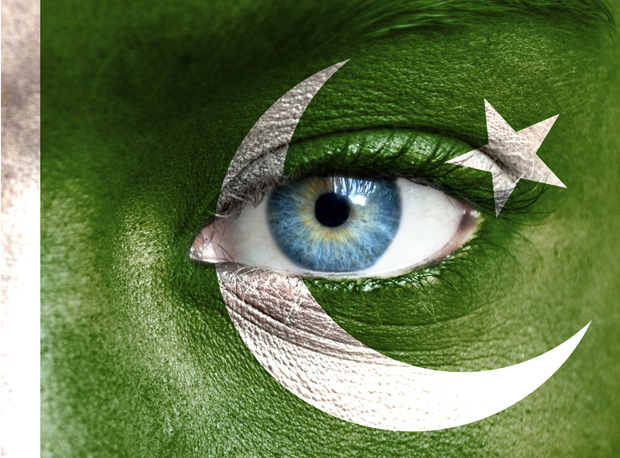Pakistan: Journalists urged to unite for protection

(Image: Aleksandar Mijatovic/Shutterstock)
In the sixth attack on Express Media employees unknown assailants threw a hand grenade at the gate of Express News bureau chief’s house in Peshawar’s Murshidabad area. Though no one was injured in Sunday’s incident, it highlights the dangers for Pakistan’s journalists.
“It was 6:30 am. I woke up to a loud screeching made by a motorbike, followed seconds later by a thunderous sound. I ran out and saw a cloud of smoke,” said 38-year old Jamshed Baghwan, speaking to Index over phone from Khyber Pakhtunkhwa’s provincial capital, Peshawar.
The main gate and the walls of neighbouring houses, said the journalist, were pocked with holes made by ball bearings packed in bomb.
This was the second attack on Baghwan. On March 19, he had found a 2 kg bomb “at exactly the same place” which was diffused in time by the bomb disposal unit.
“I have no idea why anyone would attack me,” he said. “I’ve covered the army operation in Swat when the security forces cleansed the place of militants; I’ve covered conflicts in Bajaur and South Waziristan, but there never was a threat from any quarter, so why now?” he is perplexed.
This is the sixth attack on Express Media organisation in the last nine months. Four of Express’s employees have been killed.
On March 28, a senior Pakistani analyst, Raza Rumi, working for Express News, came under a volley of gunshots after his car was intercepted by gunmen on motorbikes, while passing a busy market place in Lahore. He has been vocal in his condemnation of the Taliban and religious extremist groups. While Rumi narrowly escaped, his driver died and his guard remains critically injured.
An editorial, by Express Tribune, a sister organisation, had frustration and helplessness written all over when it read: “Shall we just close shop, keeping in mind that we are no longer safe telling the truth and the state clearly cannot, or may not want to, provide us protection or even justice?”
The same day as the attack on Baghwan, in the eastern city of Lahore, in the Punjab province, a rally was held by journalists and civil society to protest the death threats on Imtiaz Alam, secretary general of South Asia Free Media Association.
Political leaders and the government routinely condemn attacks on media workers, but have yet to take concrete action. In the meantime, journalists continue to die. Declan Walsh of the New York Times tweeted: “When militants take on journalists, this is how it goes – one by one, they pick them off. Outrage is not enough.”
With no let up in the attacks, journalists are saying they need to watch their own as well as their colleagues’ backs.
But is it possible when journalists have yet to come together?
Kamal Siddiqi, editor the Express Tribune lamented: “…there is no unity amongst the journalist community. We have a great tradition of abiding by democratic traditions but at the same time we have done poorly in terms of sticking together. There are splinters within splinters,” he wrote in his paper.
However, media analyst Adnan Rehmat, finds solidarity and sympathy for those who have been attacked or are under threat among the journalists. “It’s the media owners who are not forthcoming. The pattern and nature of attacks is consistent; but not the response from media owners,” he says.
He recently published a book titled Reporting Under Threat. It is an “intimate look into the harsh every-day life of journalists working in hostile conditions” through testimonies from 57 Pakistani journalists, including editors, reporters, camerapersons, sub-editors, news directors, photographers, correspondents and stringers working for TV channels, newspapers, radio stations and magazines.
“They don’t consider the attack on one individual an attack on all,” he points out. “While Rumi’s attack elicited a strong reaction from civil society, there was little condemnation from media houses. On the other hand, because Alam does not work for any competing newspaper or channel, it was easier to support him and this was across the board.” Part of the problem, said Rehmat was the media owners were not journalists and therefore did not equate themselves with journalists.
Rehmat believes, it is time, the media owners gathered on platforms like the All Pakistan Newspapers Society, Pakistan Broadcaster’s Association (representing private TV channels) and the Council of Pakistan Newspaper Editors and come up with a “singular response” in the form of policies that reflect that “safety of journalists is their number one priority”.
“I think the media owners are playing into the hands of the militants,” pointed out Shamsul Islam Naz, former secretary general of the Pakistan Federal Union of Journalists. “If this is a dangerous business, why hasn’t a single media owner been killed yet?” He said he had been observing the way private news channels had been covering militancy and giving unsolicited air time to banned militant outfits infraction of Pakistan Electronic Media Regulatory Authority.
Ironically, these attacks follow a high level meeting of Committee to Protect Journalists delegation with prime minister Nawaz Sharif in which the latter had pledged to address the threats to country’s journalists. Among the several commitments, was putting protection of journalists on the agenda in the ongoing peace talks with the Taliban.
According to CPJ, since 1992, 54 journalists have been killed with their motives confirmed, meaning CPJ is reasonably certain that the journalist was killed in line of duty.
While militants openly admit to the attacks, this is not the only threat to journalists. There are state elements including its intelligence agencies, members of elected political parties, even those from the business community, who may go from simply roughing up, torturing, detaining, to even killing if the dissenting voices get relentless and refuse to keep quiet.
This article was posted on 9 April 2014 at indexoncensorship.org
